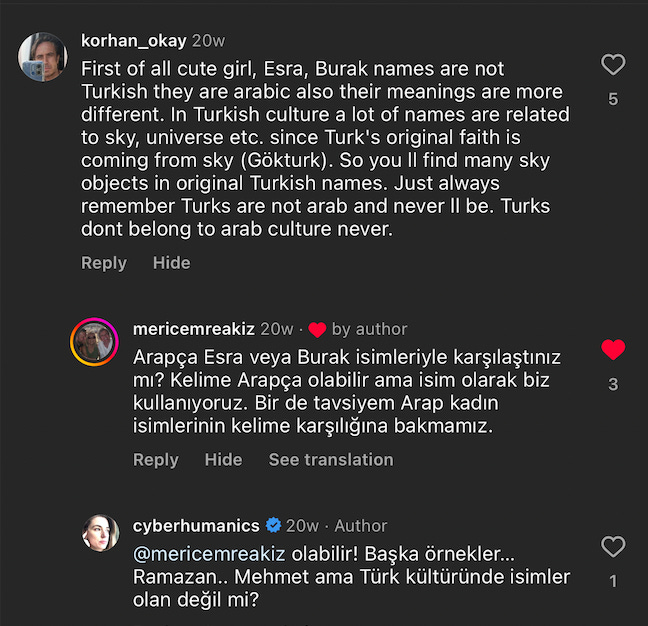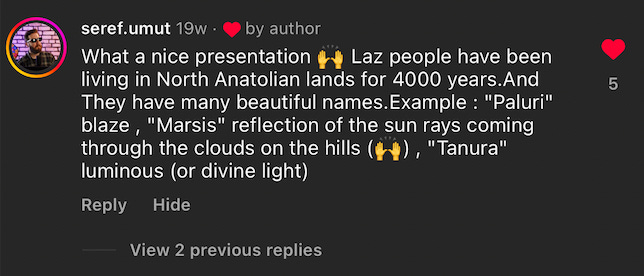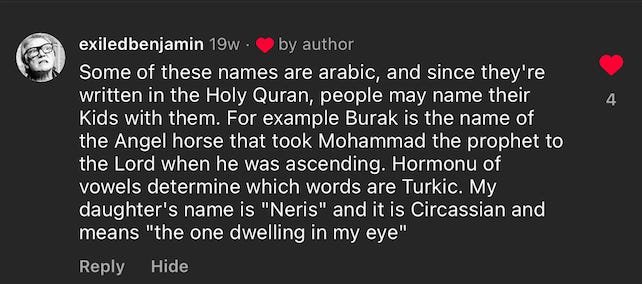Guardians of language in the AI landscape
Instead of focusing on translation and grammar, one day linguists will serve as guardians of human communication to preserve the annals of culture. I have a Turkish case study to prove it.
Executive Summary: Machine translation (MT) has streamlined the translation process, allowing professional linguists to focus on the deeper meaning of words and cultural nuances. Using localization techniques, I explore the cultural context of Turkish names in English, revealing richer and more accurate translations. Despite some limitations of MT, such as missing contextual subtleties, it remains a valuable tool for initial translations, while human linguists ensure accuracy and preserve cultural integrity. The evolving role of linguists includes not only translating and interpreting but also aiding in the development of AI systems and bridging the gap between human and machine communication.
Preserving Culture Through Translation: The Linguist’s Modern Role
When I studied under Dr. Pete Smith at the University of Texas at Arlington, he taught us that machine translation (MT) is the future. Dr. Smith emphasized that as linguists, we need to incorporate technology into our work to stay professionally competitive. Ten years later, I have seen statistical MT and neural networks make incredible strides in sentiment analysis, accuracy in transliteration, and multilingual dialogue translation.
Once upon a time, I was a subtitle contributor for Amara, a collective project that provides interpretation and translation services in foreign language for the likes of TedTalks. Now, Ted is demoing multi-lingual presentations, with the collaboration of human translators, interpreters, and AI, which imitate foreign language competency. Dr. Smith said it would happen; just a matter of time.
In one light, MT removes the grunt work of translation and interpretation, which I appreciate. Advancements in neural networks will continue to automate aspects of the workload for professional linguists. I am good with it. It gives me time and energy to focus on the linguist’s true work: the deeper meaning of words to facilitate human communication.
Last year, I decided to use localization techniques to uncover the cultural context in English for Turkish names. I wanted to share with the English speaking world the spiritual and ethereal nuances of Turkish names. Equally, I wanted to provide Turkish speaking peoples with a better understanding of their names in English. I used generative AI imagery to conjure visuals to help with comprehension.
Ayaz (m) - Frosty, cool breeze at night under the moon, Turkic Kelebek (f) - Butterfly (less common), Turkic Neslihan (f) - Noble lady, Turkic Erhan (m) - Solider King, Turkic Yıldız (f) - Star throne of destiny, Turkic Esra (f) - Night journey towards Heaven. Turkish spelling, Arabic, Hebrew Mehtap (f) - moonlight under a full moon, Turkic, Persian Burcu (f) - sweet fragrance, Turkic Aslan (m) - Lion, Turkic
Damla (f) - Raindrop, Turkic Yağmur (f) - Rain that nourishes the harvest, Turkic Tayfun (m) - Typhoon in reference to the great storm of wind and water. Arabic, Greek, Hindi, Chinese Burak (m) - Lightening used to transport the winged-horse with messages from Heaven to the Prophet, Turkish spelling, Arabic Kıvılcım (f) - The sparkling glimmer of a flame, Turkic Deniz (m) - The son of the sea, Turkic
Since modern Turkish culture was forged over thousands of years of civilization, religions and migration, many names can be found in the Levant region, the Caucasus region and Central Asia.
Bilgehan (m) - wise leader, Turkic
Özlem (f) - forgone yearning, Tturkic
Nurdan (f) - holy illumination, Arabic-Turkic
Ayhan (m) - king of the moon, Turkic
Bulut (m,f) - heavenly clouds, Turkic
Aylin (f) - moonhalo, Turkic
Betül (f) - nobly chaste, Turkic, Arabic
Selçuk (m) - skilled orator, Turkic
Neris (f) - dwelling in ones sights, Circassian
Göksel (m, f) - heavenly sky, Turkic
Rüzgar (m, f) - wind of destiny, Turkic-Persian
Elif (m, f) - elegantly forthright, Arabic
İpek (f) - pure silk, Turkic
Emine (f) - fearlessly steady, Turkish spelling, Arabic
Once subscriber named Sinem lamented the definition of her name in English “my breast”. This is where cultural specialists can help. After my research, I localized a more accurate translation: “my heart” in modern English and “my bosom” in 19th-20th Century English. The myopic translation of Sinem to breast occurred without the necessary context. Now, Sinem has a deeper knowledge of her name in English to share with other English speakers- a less awkward definition, too.
Then, there was Çağri, who said his name means “call”. After I looked into it, the name Çağri has more significance than simply to give a ring. I understand Çağri to mean “The Call” as in having a higher appellation to distinguish things or people. English’s article the makes a difference.
After posting the content on Instagram for the world to see, the results were interesting, to say the least. The discussion opened debate about who owns the name. Does an Arabic origin name, even with a Turkish spelling, make it Arab or Turkish? What role does cultural assimilation play in the adaption of names? Or, if name origin signifies identity. Can someone with a Hebrew name be Turkish? Subjective and complex conversations, indeed.
There was a little sexism in the comments section, but appreciation overshadowed it. I did receive some defensive feedback from a few accounts identifying as Greek, and there is some culture clash there. Mostly, I learned much from the comments section, which was filled with Turkish, Caucasian, and Circassian peoples sharing information and adding rich value that is not readily available online.
Did I use MT? Absolutely, it helps me check for errors. If you are conducting research and want a reliable free resource for translation, I find Google Translator Toolkit to be of such high quality these days. Eight years ago, I would have hesitated to recommend MT. Now, it offers interpreter mode, website and word selection, emails, off-line features, and audio and image translation.
Did MT fail at some of the translations? Absolutely. The localized versions of these names required researching and reading various Turkish source material. Then, I combed through English thesauruses to find the best matches. All of which, MT missed because language AI has limits.
MT can be a fast friend, too. It is important to cross check MT with other translation engines, and look for deviations. If you have no foreign language knowledge, be wary of translations regarding highly contextual content. The more dense the cultural context, the weaker the translation. This is especially true for sub-cultural feeds.
Since MT makes mistakes, traditional linguists are still safe professionally as translators and interpreters. However, what this looks like in ten years will be a different story. The deeper your research touches on the nuances of human interaction and cross-cultural context, the more secure your job will be.
One huge growth area for linguists is audio translation, especially if you are multilingual. I expect companies with a stake in this to hire multilingual analysts who can break down complex audio and help transition it to databases to improve AI.
At this point, the robotics industry is not far from multilingual robots. Our jobs are going to be helping train the AI systems. I can see a future where human linguists serve as a polygraph of sorts to detect the virtual people and humanoids from human beings. That is why we still need to learn the languages ourselves.
The more intertwined our cultures become due to the nature of global communications and AI, the greater need there will be for language and cultural studies. I view the neural network component of machine translation, differing from statistical machine translation, as merely an advanced stepping stone to global human communication and understanding.
Overall, linguists still have valuable roles to play in the evolution of what being a translator and interpreter means. In a way, there is an immense responsibility for linguists to help preserve the integrity of human culture. In a sense, linguists will be guardians of human language and communication bridging the gap between human and machine.
Or, has this always been the mission?
~E
Gray Truths©️2024










Fascinating, Elizabeth. I learn something new with every blog.